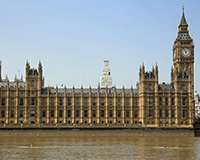Is Nigel Farage the king of the swingers?
I think I was the only lobbyist at last month’s UKIP conference at Doncaster Racecourse (apart from an esteemed colleague).
I say that, though I did bump into two “undercover” representatives of a national organisation – trying to look inconspicuous in their civvies – who looked at me as though they’d seen a ghost when I hailed them. Or as if I’d surprised them at a swingers’ party.
I suppose UKIP are political swingers of a sort. They are “what’s happening” in British politics. They have the same momentum and they are drawing support, so the received wisdom goes, from all types of voters.
Maybe that is why business is trying so hard to fathom what UKIP means for them. Heaven knows it is hard enough to predict the outcome of the 2015 general election. It is the dinner party question I am asked constantly.
Nobody knows, of course: the people decide. But remember, Labour needs only a 2% swing to achieve an overall majority. That’s why the party feels like a football team hanging on in the 89th minute for a 1-0 win. The trouble is that “swing” is three or four-dimensional these days. Tory to UKIP. Labour to UKIP. Liberal Democrat to Labour. Non-voter to voter. And so on.
These effects will, to some degree, cancel each other out. The Lib Dems, seemingly reviled by the electorate, will conduct an “Alamo strategy” to hang on to about 30 key seats. This means the party could well still be in the business of coalition, and its unspoken rule is that it partners with the party with the highest absolute number of votes.
This month’s by-elections provided starker news for the Conservatives than for Labour.
Sure, Labour clung on by its fingernails in Heywood and Middleton, but it did increase its share of the vote in a campaign that saw it having to defend accusations of turning a blind eye to systematic child abuse in Northern towns.
Clacton was a thumper for UKIP but doesn’t really tell us much about the likely election result.
The telling data comes in the fact that while 4% of Labour voters from 2010 say they’d now vote UKIP, 14% of Conservatives say they would.
For the real estate sector there are two big implications from the rise of UKIP.
The first is uncertainty on the ground. Where UKIP starts to build a councillor base at local authority level, and finds its way onto planning communities, proposals to build or redevelop will likely face a tougher ride.
In the Eastern and estuarial districts, regeneration – a buzzword for so long beloved by the property sector – is viewed as a by-word for immigration by an embattled, left-behind and hostile ageing white working class.
As value opportunities fan out from London, for real estate investors a closer and harder look will have to be taken at how the politics of any development proposal will play out on the ground.
At a macro level, the positioning of some sort of “Tory-UKIP” accommodation (pact) come 2015, or even after, if UKIP harvests half a dozen or so seats, will make an early EU referendum more possible.
The real possibility of a “Brexit” will loom into view.
If readers recall how queasy the markets got over Scotland exiting the UK, just think what the prospect of the EU losing one of its largest members would do for the already faltering European “recovery”.
It won’t matter whether your country – or your real estate assets – are in or out of the EU, or the eurozone for that matter. The instability will create a slide in values that our perhaps erstwhile European partners will find it difficult to forgive.
And all because of the long-running sore of Europe in a splinter of the British Conservative Party.
Cheers guys!
Jon McLeod is public affairs chairman of Weber Shandwick











